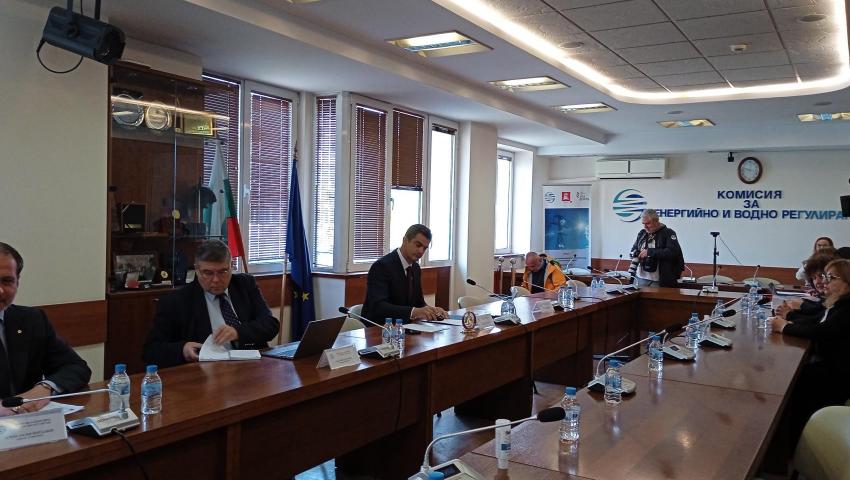Electricity distribution companies don’t agree with the non-recognition of their energy efficiency costs by the EWRC and some price components

Representatives of the energy companies praised the positive trend to improving of the regulatory framework, but expressed disagreement to the price components in the calculation of electricity prices for households for the next regulatory period during today's open meeting at the EWRC on prices in the electricity sector.
In general, the representatives of the three electricity distribution companies united in their disagreement concerning the inflation adjustment, operating costs, the calculation of technological losses and the non-recognition of energy efficiency costs.
"We consider the report as the beginning of a positive trend in the direction of improving the regulatory framework and creating stability in the current geopolitical crisis, which entails an economic and energy one," said Zornitsa Genova of Elektrodistribution Networks West (she also voiced some of Elktrohold's objections).
First of all, Genova expressed her disagreement regarding the balancing costs in relation to the electricity distribution company. It has been maintained at the level of 1.8 BGN per MWh since 2016 and does not take into account the higher exchange prices at which the companies buy energy on the exchange for their technological costs, the increased balancing cost which is linked to the price in the day-ahead segment, and the introduction of the 15-minute settlement interval for balancing. These increases all lead to an increase in balancing costs and we believe that an amendment to the approved amount is necessary, Genova said.
She also disagreed with the inflation index applied to the previous period, which she said only partially reflected the expected increase in materials to maintain the network. "We maintain our view in the submission that the adjustment should be at the rate of 7.8 per cent, which is the consumer price index for December compared to December 2020 according to official NSI data," she said.
Genova also commented on the approach of applying the so-called Z-factor. According to her, the calculation of the Z-factor adjustment should be in accordance with the regulator's regulations, and only then the resulting adjustment should be reduced by the compensation that network operators received under the Council of Ministers' Decree. "Namely, the adjustment should be between the approved estimated market price of BGN 131 and the achieved weighted average price, in our case BGN 382, at an approved technology cost of 7.5%. From the result obtained, the compensation must be deducted,” she said. According to her, this will also lead to the result to be taken into account for pricing. Nowhere is the cost per MWh of compensation received calculated, Genova added.
Regarding the supplier of last resort Elektrohold, Zornitsa Genova expressed disappointment with the non-recognition of energy efficiency costs, given that, as she put it, "by the law they are considered as alternative measures".
Plamen Mladenovski, Director of the Electricity and Thermal Energy Directorate at the EWRC and head of the working group that drafted the reports, commented on his part in response to some of the remarks. According to him, balancing costs are currently very low. Regarding the inflation adjustment, he reminded that they were dealing with data from the previous year.
Anna Dimitrova from Elektrodistribution South and EVN pointed out that the estimated price for the technology costs is close to those calculated by the company as well. At the same time, she also disagreed with the inflation index proposed by the regulator and defended the company's thesis to apply one of 7.7%. Otherwise, she said, it would cause the company to fall behind on the repair programme. Dimitrova also objected to the company's failure to recognise energy efficiency costs. She stressed the impossibility in which the company was placed to meet national energy saving targets.
Desislava Rousseva, on behalf of Energo-Pro, commented that the adjustment of operating costs presented in this way did not reflect the objective situation. She also joined the objections of the other companies regarding the technology costs, stressing the role that renewables have on the grid.
During the meeting, EWRC member Alexander Yordanov, responding to the companies' remarks on the non-recognition of energy efficiency costs, said that if the companies achieved lower costs the regulator would find a way to incentivise the company. He also expressed a serious reservation regarding the so-called white certificates. Yordanov also made a remark regarding technology costs, noting that real costs should be compensated and not later turn out to be overpaid.
There were also objections against the CEWRC decision from ESO and NEK.
Later, EWRC Chairman Stanislav Todorov told journalists that the average increase in electricity prices for households from July 1, even after the reservations expressed by the companies, would be within 3 percent for the new regulatory period.
As it became clear earlier, the regulator proposes that the electricity price for household consumers be increased by 3.3 percent on average.
For the customers of "Electrohold Sales" (CEZ) the estimates indicate an increase of 2.39 percent, for "EVN Bulgaria Electricity" - by 3.46 percent, for the customers of "Energo-Pro Sales" - by 4.56 percent. These prices include the price of electricity and the prices for network services.
The CEWRC chairman pointed out that the regulator managed to reduce the requested increase by the companies by about 100 percent. This was done by removing the obligation to society fee (previously BGN 7). The share of Kozloduy NPP is higher in the mix for households (between 20-30%) because of the low production cost. Premiums to almost all RES producers have also been stopped, except for a few solar parks. This makes it possible to compensate the higher costs of the electricity distribution companies. "Domestic consumers in Bulgaria will receive a price that is commensurate with inflation of about 3 percent, and not, as on average in Europe, increased by about 45 percent," Stanislav Todorov clarified.
